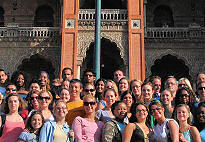Record number of students headed for Brazil this summer
May 18, 2009
For 19 Georgia State University College of Law students, summer school will mean trekking into the Atlantic rain forest to study the threat urbanization poses to one of the world's most delicate ecosystems, or a trip inside one of the world's most impoverished neighborhoods to examine how community projects are trying to curb violence in one of Brazil's infamous slums or “favelas.”
These students will join more than 100 law students from around the country and Brazil participating in the Summer Legal Study Program in Rio de Janeiro, hosted by Georgia State University College of Law and the Center for Comparative Study of Metropolitan Growth. The program consists of a consortium including law schools at The University of Tennessee, University of Seattle, and the host school, Rio's Universidade Cândido Mendes. Beginning May 18, students will attend the first of two 2-week sessions at the Brazilian university located in the business and judicial heart of Rio, one of the world's largest cities and one of the most dynamic cities in South America.
Now in its fifth year, the Rio program is experiencing record enrollment and has become one of the premier legal study-abroad programs hosted in the developing world, according to the program's director, Georgia State Law Professor Colin Crawford (pictured below).
The program's goal is to not only instruct students in the traditional classroom setting, Crawford said, but also to expose them to real-world complexity, problems and solutions facing a large metropolis like Rio. Classes range from environmental, land-use and business law to civil rights, health and family law. Seeing how each of these disciplines is treated outside of the United States, is an invaluable experience for every future attorney, Crawford said.
“Given the highly globalized world we live in, foreign study makes you a better lawyer,” Crawford said. “There are many ways to solve legal problems, so understanding a legal system in a different cultural context is important. It gives you a new perspective on your own work, career and possibilities, and on the way we do things here in the United States. It opens up students thinking to what they can do with their careers and their lives.”
Besides a wide variety of classes and an emphasis on applied learning, Crawford said the program also offers rigorous course work. The courses will be taught by more than a dozen instructors from Georgia State, the Universities of Tennessee, Seattle, Emory, Yale, California-San Diego and Cal-Berkeley and various Brazilian institutions, and will be supplemented by lectures from leaders in Brazilian law, government, business and civil society.
“We have some of the most distinguished people in the country teaching a number of these courses,” Crawford said. “Our programs are rigorous. We have a great time, but there's also serious reading and study.”
Students will be staying in Rio's coastal neighborhood of Copacabana, and will have the opportunity to live and study in one of the most fashionable and beautiful communities in the world. However, there's also an emphasis on exposing students to the wide dichotomy of Brazilian life, where residents in other areas suffer abject poverty in large city slums or remote rural villages. Students will make several day treks into different regions of Rio de Janeiro from the state's capitol city, to make this juxtaposition of wealth and poverty a touchstone for class discussions.
Third-year Georgia State Law student Rob Lafayette, a former participant in the Rio study-abroad program, said seeing the relationship between life and law in another country offers an invaluable perspective for law students no matter where they want to practice.
“You get exposure to a different culture and the different civil system, so you get to see another side of the law,” Lafayette said. “It helps broaden your perspective on the world in general.”
Students will begin their summer studies in Rio May 18 for the first two-week module ending on May 29. Most students will stay for the second module beginning June 1 and ending June 12.
Benjamin Price
Student, Georgia State University College of Law